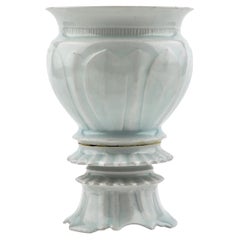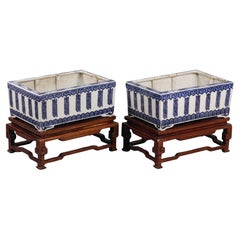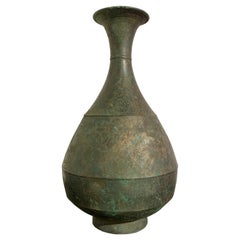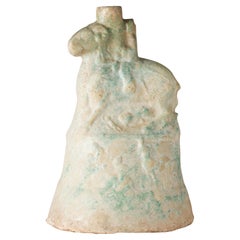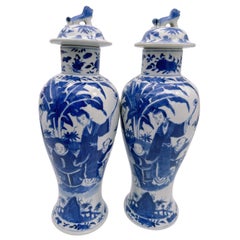18th Century and Earlier Antiquities
to
354
277
93
805
4
2
1
1
1
805
643
656
21
304
76
68
37
3
17
11
7
17
8
9
18
3
472
175
149
112
105
778
474
272
244
147
805
805
805
Period: 18th Century and Earlier
Qingbai Lotus Censer, Song Dynasty
Located in seoul, KR
This exquisite Qingbai piece, acquired in Hong Kong in the late 1990s, is a high-quality artifact from the Southern Song Dynasty, likely produced at the Hutian Kiln. The base exhibit...
Category
Hong Kong Antique 18th Century and Earlier Antiquities
Materials
Ceramic
$10,000 Sale Price
50% Off
pair of Chinese blue & white porcelain planters, 18th c.
Located in New York, NY
rectangular porcelain planters, each on a fitted wooden base; overall with wooden base: 7.7in(H) x 10in(L) x 6.5in(D); planter only: 9.6in(L) x 6.1in(D) x 3.8in(H)
Category
Chinese Antique 18th Century and Earlier Antiquities
Materials
Porcelain
Korean Bronze Bottle Vase, Goryeo Dynasty, 11th/12th Century, Korea
Located in Austin, TX
An attractive Korean Goryeo Dynasty bronze bottle vase with traces of gilding, 11th - 12th century, Korea.
The vase of typical form, with a short recessed foot supporting a pear s...
Category
Korean Antique 18th Century and Earlier Antiquities
Materials
Bronze
Changsha Ewer, Tang Dynasty
Located in seoul, KR
It features two small lug handles on either side of the neck and a spout opposite the main handle. This ewer might have been used for wine or other liquids, which were poured through...
Category
Hong Kong Tang Antique 18th Century and Earlier Antiquities
Materials
Pottery, Stoneware
$1,516 Sale Price
60% Off
Green-Glazed Pottery ‘Money Tree’ Base, Han Dynasty
Located in seoul, KR
This piece, directly referred to as a Money Tree, is a captivating work that embodies wishes for material prosperity. It takes center stage in the Asian collections of institutions s...
Category
Hong Kong Han Antique 18th Century and Earlier Antiquities
Materials
Earthenware, Pottery
$19,500 Sale Price
35% Off
18th Century Antique Pair of Chinese Blue and White Porcelain Jars and Covers
Located in Brea, CA
Qing Dynasty pair of antique 18th century Chinese blue and white porcelain jars and covers ,the lids with lions form fini...
Category
Chinese Chinoiserie Antique 18th Century and Earlier Antiquities
Materials
Porcelain
Changsha ewer, Tang Dynasty(618-907)
Located in seoul, KR
Changsha Ware has distinct and recognizable designs and motifs. Painted designs often depict flowers, vines, clouds and mountain landscapes. Some painting is simply splotches of colo...
Category
Hong Kong Tang Antique 18th Century and Earlier Antiquities
Materials
Stoneware
$3,196 Sale Price
60% Off
Chinese Song Period Celadon Glazed Bowl
Located in London, GB
A Chinese Song period celadon glazed bowl. Petal form rim and hand-carved decoration to the interior.
Really nicely thinly potted example with cra...
Category
Chinese Archaistic Antique 18th Century and Earlier Antiquities
Materials
Pottery, Stoneware
Cloisonné Enamel Vase, Early Ming Dynasty(15th century)
Located in seoul, KR
This exquisite vase is a fine example of Ming Dynasty cloisonné, an era renowned for revolutionizing the cloisonné technique with intricate design and vibrant enamel work. The cylind...
Category
East Asian Ming Antique 18th Century and Earlier Antiquities
Materials
Bronze, Enamel
$5,997 Sale Price
70% Off
18th Century, Shan, Antique Burmese Wooden Seated Buddha
Located in Sampantawong, TH
Antique Burmese wooden Buddha sitting in Mara Vijaya (calling the earth to witness) posture on a base.
Age: Burma, Shan Period, 18th Century
Size excluding stand: Height 71.6 C.M. /...
Category
Burmese Antique 18th Century and Earlier Antiquities
Materials
Wood
Two Pottery Kneeling Figures of Attendant, Han dynasty
Located in seoul, KR
The statuette shows traces of the original red, black, and white pigmentation. Ceramic statuette from the han Dynasty, depicting two court people, probably a musician. They are dress...
Category
Hong Kong Han Antique 18th Century and Earlier Antiquities
Materials
Pottery
$1,937 Sale Price / set
35% Off
Ancient Polished Sandstone Lingam, Khmer, 12th-13th C., Angkor Period
Located in New York, NY
An Ancient Polished Sandstone lingam stone with an octagonal shaft which Rises from a Square Base, Khmer Period, 12-13th Century, Angkor Period. A fan...
Category
Cambodian Antique 18th Century and Earlier Antiquities
Materials
Sandstone
Moulded Goldfish Blue and White Dishes, Ming Dynasty
Located in seoul, KR
Exquisitely decorated set of plates, dating back to around 1500, from the Hongzhi or Zhengde period. Intricately adorned with a raised, moulded goldfish design. The goldfish, painted in a orange-red enamel, are set amidst water plants depicted in rich cobalt blue.
These plates enjoyed widespread popularity, not only in the local markets of China but also overseas in countries. This style of plate played a significant role in the daily life of the Sengoku period in Japan, as evidenced by several similar flat bowls excavated from the Ichijodani Asakura Ruins in Fukui Prefecture, Japan, along with other ceramic artifacts...
Category
Indonesian Ming Antique 18th Century and Earlier Antiquities
Materials
Ceramic
$1,950 Sale Price / set
50% Off
Small Qingbai Pear-Shaped Vase, Song-Yuan Dynasty(13-14th century)
Located in seoul, KR
This exquisite piece is a Qingbai ware from the Song to Yuan dynasty, and it appears to be an excavated artifact given its earthy encrustations, suggesting it has rested in the groun...
Category
Hong Kong Antique 18th Century and Earlier Antiquities
Materials
Ceramic, Porcelain
$895 Sale Price
50% Off
Amber-Glazed Pottery Figure Of A Foreign Official, Tang-Liao Dynasty(7-12th c)
Located in seoul, KR
The figure stands with arms crossed in front, a pose that is often seen in tomb figurines which were intended to serve the deceased in the afterlife. The long robe and facial feature...
Category
Hong Kong Tang Antique 18th Century and Earlier Antiquities
Materials
Earthenware
$1,885 Sale Price
35% Off
Celadon Ewer with Straight Handle, Tang to Northern Song Dynasty
Located in seoul, KR
Celadon-glazed ewer characterized by its simple and functional design. The piece features a straight handle extending horizontally from the body and a short spout for pouring liquids...
Category
Hong Kong Tang Antique 18th Century and Earlier Antiquities
Materials
Celadon
$2,925 Sale Price
35% Off
Extremely Rare Famille Noire Vases from Ca Mau Ship, Qing Dynasty, Yongzheng Era
Located in seoul, KR
Famille noire is a type of Qing Dynasty Chinese porcelain, distinguished by its black-glazed background with vivid natural motifs in green, yellow, and other bright colors. Developed...
Category
Vietnamese Qing Antique 18th Century and Earlier Antiquities
Materials
Ceramic, Porcelain
$2,240 Sale Price / set
30% Off
Pair Tang Dynasty Dancing Figures, China '618-907AD'
Located in Dallas, TX
Period: Tang Dynasty (618 – 907 AD) terra-cotta over lead clay
A pair of delicate Tang Dynasty dancers with long sleeves. Both ladies are wearing a long flowing dress with flared ...
Category
Chinese Antique 18th Century and Earlier Antiquities
Materials
Terracotta
18th Century, Shan, Antique Burmese Wooden Seated Buddha
Located in Sampantawong, TH
Antique Burmese wooden Buddha sitting in Mara Vijaya (calling the earth to witness) posture on a base.
Age: Burma, Shan Period, 18th Century
Size: Height 41.7 C.M. / Width 21.8 C.M....
Category
Burmese Antique 18th Century and Earlier Antiquities
Materials
Wood
Two Annamese Small Yuhuchunping, 15th century, Le Dynasty
Located in seoul, KR
These 15th-century Annamese ceramics from Le dynasty, are notable for their rarity and refined design. The Yuhuchunping vases, with their elegant pear-shaped bodies and delicate blue...
Category
Vietnamese Ming Antique 18th Century and Earlier Antiquities
Materials
Ceramic, Stoneware
$1,553 Sale Price / set
35% Off
Antique Ceremonial Urns, Song Dynasty, 12th-13th Century
Located in New York, NY
Two tall ceremonial urns dating from the 12th-13th century, Southern Song dynasty. Glazed terracotta. They depict 12 traditional ritual attendant...
Category
Chinese Other Antique 18th Century and Earlier Antiquities
Materials
Earthenware
Chinese export porcelain teapot w/ dish, 18th c.
Located in New York, NY
4in(D) x 6in(W) x 4.5in(H) are the dimensions of the teapot; floral motif; wooden stand is not included with this lot
Category
Chinese Antique 18th Century and Earlier Antiquities
Materials
Porcelain
$3,000 / set
Rare Cream Glazed Ding yao Ewer and Cover, Song Dynasty (960~1279)
Located in seoul, KR
This is a Song Dynasty ceramic ewer, exhibiting the characteristic simplicity and elegance of the period. The ewer's form is sturdy with a full-bodied base that tapers gently to a na...
Category
Hong Kong Chinese Export Antique 18th Century and Earlier Antiquities
Materials
Ceramic
$9,950 Sale Price
50% Off
Ancient Gu Shape Blue And White Vase, Qing Dynasty, Kangxi Era, Circa 1690
Located in seoul, KR
An attractive gu vase hand painted in cobalt blue with typical kangxi floral painting.
Period : Qing Dynasty, Kangxi Period
Production Date : 1690-1699
Made in : Jingdezhen
Destination : Netherland
Found/Acquired : Southeast Asia , South China Sea, Vung Tau ship
Reference : Double checked with reference to the original catalogues
1) Christies Amsterdam 1992 - Vung Tau Cargo / Christies
2) Qing Dynasty Export...
Category
Vietnamese Qing Antique 18th Century and Earlier Antiquities
Materials
Ceramic, Porcelain
$1,868 Sale Price
24% Off
Rare Blue and Red-Copper Peacock Yuan Dinesty
Located in Newmanstown, PA
Rare Blue and Red-Copper Dish Yuan Dynasty Painted to the interior with a peacock in a lively garden and seal mark, repeated on exterior. Height: 2.5 in, Width: 16.5 in, Base Width: 10.25 in
During the Yuan dynasty (1271-1368), blue and white porcelain developed in Jingdezhen of Jiangxi province became increasingly popular, earning Jingdezhen the recognition of China’s ceramic metropolis. The cobalt ore used in the blue pigment for Yuan dynasty blue-and-white wares were originally imported from Persia. While a formative influence in Yuan blue...
Category
Chinese Antique 18th Century and Earlier Antiquities
Materials
Porcelain
Two white ware vases with flower design, Yuan Dynasty, 14th century
Located in seoul, KR
Porcelain with transparent pale-green (qingbai-type) glaze with flower, leaves and lotus design of typical yuan dynasty.
Period : Yuan Dynasty(1271-1368)
Type : Baluster vase
Medium...
Category
Hong Kong Antique 18th Century and Earlier Antiquities
Materials
Ceramic, Porcelain
$2,392 Sale Price
20% Off
Chinese blue & white porcelain cover jar, 18th c.
Located in New York, NY
floral motif
Category
Chinese Antique 18th Century and Earlier Antiquities
Materials
Porcelain
Longquan Celadon Figurine, Ming Dynasty (1368-1644)
Located in seoul, KR
This sculpture is a Longquan celadon from the Ming Dynasty, renowned for its rich and jade-like green glaze. The figurine is likely a representation of a Buddhist deity or a revered scholar, showcasing the calm aesthetic expressions and graceful contours prevalent during the era. The spectrum of celadon glaze ranges from a dense grey stoneware to a nearly white porcelain texture, with unglazed parts revealing a terracotta brown upon firing. Such pieces were often part of household altars, reflecting the era's spiritual devotion. This artifact would be a treasured exhibit in any museum's Asian art collection, symbolizing both religious reverence and artistic excellence.
Period: Ming Dynasty (1368-1644)
Region: Longquan, China
Medium: Stoneware - Celadon glazed, with a range from heavy grey to almost white porcelain-like material
Type: Sculpture
Height : 24.5 cm
Provenance : Acquired in 1999, Hongkong
* Ming Dynasty Longquan Celadon
Longquan celadon from the Ming Dynasty typically exhibits a more robust and heavier stoneware body compared to its Song Dynasty predecessors. The Ming era saw an evolution in celadon glaze, achieving a wider spectrum of green hues, from olive to bluish-greens. Ming celadons...
Category
Hong Kong Ming Antique 18th Century and Earlier Antiquities
Materials
Celadon
$3,835 Sale Price
35% Off
Japanese Antiques Kato-style(Firelight-shaped) wood window, for temples building
Located in Niiza, JP
1060(W)× 1400(H) × 85(D) [mm] 32kg
Firelight (Kato-style) window used in temple building materials
So named because of its shape that looks like a fire is burning
The inside of the ...
Category
Japanese Antique 18th Century and Earlier Antiquities
Materials
Wood
Green-Glazed Tripod Vessel, Han Dynasty
Located in seoul, KR
Han Dynasty green-glazed tripods are comparatively rare, especially ones that have retained their structural integrity and glaze over millennia. Pieces in good condition are scarce b...
Category
Hong Kong Han Antique 18th Century and Earlier Antiquities
Materials
Earthenware
$1,235 Sale Price
35% Off
Olive-Brown-Glazed Molded Ewer And Cover, Song-Yuan Dynasty
Located in seoul, KR
The oviform body molded with floral and leaf pattern reminiscent of waves, all covered with an olive-brown glaze. The glaze drips and irregular streaks of brown-glazed pottery from that period are distinctive aesthetic elements of Song-Yuan Dynasty brown glazed ceramics, with glaze colors ranging from deep chocolate to light amber or honey tones.
Date : Song-Yuan Dynasty(960~1368)
Type : Olive-Brown-glazed pottery
Provenance : Acquired in late 1990s from Hongkong
Reference :
1) Bonhams London 13 May 2024 - The John E. Bodie OBE (1930-2023) Collection of Chinese Art - Lot 12
(Price realised : 2,432 GBP / Type : Related)
2) Christies Mar 2015 - The Collection of Robert Hatfield Ellsworth...
Category
Hong Kong Antique 18th Century and Earlier Antiquities
Materials
Pottery
$2,786 Sale Price
30% Off
A Stucco Torso of the Buddha, Gandhara, 4th-5th Century
Located in Dallas, TX
PRESENTING a STUNNING piece of Indian Antiquity from circa the 4th-5th Century, namely, A Stucco Torso of the Buddha, Gandhara.
Ancient Gandhara is located in the rugged foothills of the Himalayas in what is today northwest Pakistan and eastern Afghanistan, was for centuries a thriving center of trade along the Silk Road linking China, South Asia, and the Mediterranean.
The piece was purchased by a Private Collector at Sotheby’s, or more probably, Christies of New York Auction pre-2000. The paper label on the wooden base is “7281/465” for Sale Number 7281, Lot No. 465.
Sotheby’s and Christies operate a twice yearly auction of Southeast Asian Art & Antiquities in New York in the months of March and September.
The Sale Number is more like a ‘Christies;’ Sale Number but we cannot locate any records for this sale online as it was pre-2004.
The sculpture is a Gandharan stucco headless bust...
Category
Afghan Medieval Antique 18th Century and Earlier Antiquities
Materials
Stucco
Antique Qing Dynasty Chinese Twin Handled Bronze Censer Xuande Marks to Base
Located in Brea, CA
Qing dynasty 18th century Chinese twin handled bronze censer bearing XuanDe marks to base , 990 grams , 17cm wide, internal width 10cm , 7cm high.
Category
Chinese Qing Antique 18th Century and Earlier Antiquities
Materials
Bronze
White Ware Moulded Baluster Form, Yuan Dynasty, 14th century
Located in seoul, KR
This vase is made from a type of low-fired, porous clay and features a crackled glaze. It bears resemblance to the renowned funerary vases and covers adorned with applied decorations...
Category
Hong Kong Antique 18th Century and Earlier Antiquities
Materials
Ceramic, Porcelain
$950 Sale Price
50% Off
Stone Head of Bodhisattva, Northern Wei-Tang Dynasties
Located in seoul, KR
The face with downcast eyes and a smile, the hair swept up behind the pendulous ears into a high topknot. Faint traces of pigmentation hinting at the sculpture's original polychromy. The black stand was made in Hong Kong at the time of the acquisition.
Date : Northern Wei-Tang Dynasty(5-8th century)
Provenance : Acquired in late 1990s from Hongkong
Reference :
1) Sotheby's London 13 May 2015 - The Soul Of Japanese Aesthetics – The Tsuneichi Inoue Collection - Lot 18
(Price realised : 17,500 GBP / Type : Closely related)
2) Sotheby's New York 26 September 2023 - CHINA / 5000 YEARS - Lot 1156
(Price realised : 8,890 USD / Type : Closely related)
* Stone Head of Bodhisattva...
Category
Hong Kong Tang Antique 18th Century and Earlier Antiquities
Materials
Limestone
$5,196 Sale Price
60% Off
Tang Dynasty, Antique Chinese Painted Pottery Horse and Rider
Located in Sampantawong, TH
Antique Chinese painted pottery horse and rider.
Age: China, Tang Dynasty, A.D. 618 - 907
Size excluding stand: Height 36 C.M. / Width 9.7 C.M. / Length 31.6 C.M.
Condition: Well-pr...
Category
Chinese Antique 18th Century and Earlier Antiquities
Materials
Pottery
Longquan Celadon 'Dragon' Jar and Cover, Song Dynasty(1127–1279)
Located in seoul, KR
A similar jar with a cover, part of the Avery Brundage collection at the Asian Art Museum in San Francisco, is featured in Mary Tregear's "Song Ceramics" (London, 1982, plate 286). T...
Category
Hong Kong Antique 18th Century and Earlier Antiquities
Materials
Celadon
$6,950 Sale Price
50% Off
Special Antique Decorated Porcelain Cache Pot
Located in North Salem, NY
Special Antique Blue & White Porcelain cache pot. Circa 1760.
Category
Antique 18th Century and Earlier Antiquities
Materials
Porcelain
Kamakura Period Japanese Shinzu Sculpture
Located in Hudson, NY
Kamakura Period Japanese Shinzu sculpture. Shinzo is a representational figure of a god or spirit in the Shinto religion. This sculpture was carved fro...
Category
Japanese Antique 18th Century and Earlier Antiquities
Materials
Wood
Sancai-Glazed Pottery Tripod Jar, Tang Dynasty
Located in seoul, KR
The globular body is supported on three claw feet and is covered in a splashed-glaze of amber, green and cream color, which stops short of the unglazed base.
Date : Tang Dynasty(61...
Category
Hong Kong Tang Antique 18th Century and Earlier Antiquities
Materials
Earthenware
$3,185 Sale Price
35% Off
Late 18th C. Chinese Wooden Hand-carved Panels From the Qing Dynasty - a Pair
Located in Louisville, KY
When it comes to wanting that perfect and unique conversation piece in your beautiful room, look no further than these antique hand carved wood Chinese panels. These are stunning. Wo...
Category
Chinese Qing Antique 18th Century and Earlier Antiquities
Materials
Metal
Japanese Antiques Primitive Art wood Shrine for Buddhist statues
Located in Niiza, JP
1200(W)× 860(H) × 250(D) [mm] 10kg
A soot-covered shrine thought to be from the Edo period
It is for home use and very simple
Even so, it is much larger than normal
There are no Bud...
Category
Japanese Antique 18th Century and Earlier Antiquities
Materials
Wood
Black-Glazed Russet-Painted Bottle Vase, Northern Song-Jin Dynasty
Located in seoul, KR
Of broad pear shape rising from a low foot to a waisted neck and flared rim, covered overall with a lustrous brownish-black glaze with rare six bands of russet-strokes radiating in yuhuchunping shape.
Period : Northern Song-Jin Dynasty
Type : Yuhuchunping
Medium : Black glazed with russet painted
Provenance : Acquired in late 1990s from Hongkong
Reference :
1) Bonhams London 12 MAY 2016 - Fine Chinese Art - Lot 30
(Price realised : £ 37,500 / Type : Closely Related)
2) Bonhams London 11 MAY 2021 - Roger Keverne Ltd Moving On - Lot 99
(Price realised : £12,750 / Type : Related)
3) Christies NEW YORK 22 MAR 2018 - The Classic Age of Chinese Ceramics - The Linyushanren Collection, Part III - Lot 521
(Price realised : 35,000 USD / Type : Closely Related)
4) Christies HONG KONG 30 MAY 2024 - Important Chinese Ceramics and Works of Art - Lot 2854
(Price realised : HKD 201,600 / Type : Related)
* Black-glazed ceramics in Northern Song-Jin dynasty
Black-glazed ceramics, also known as "black ware," were prominent during the Northern Song (960–1127) and Jin (1115–1234) dynasties. The creation of these ceramics involved the application of a rich, dark glaze, typically achieved using iron oxide. This glaze was applied over a stoneware or porcelain body, then fired at high temperatures to produce a glossy, dark finish ranging from deep brown to black. Notable techniques included the "tea-dust" glaze, which exhibited a speckled appearance, and the "oil-spot" glaze, characterized by small, iridescent spots. The high-temperature firing process was crucial for achieving the desired glaze effects and durability.
The design of black-glazed ceramics often included intricate carvings, incised, or molded decorations. Common forms included bowls, vases, jars, and ceramic pillows. These pillows, used as headrests, featured detailed designs such as floral patterns, animals, and mythical creatures. An example of this is a black-glazed ceramic pillow from the Jin dynasty, which features carvings of two lions. Similar pieces can be found in the Guanfu Museum, where black-glazed pillows...
Category
Hong Kong Antique 18th Century and Earlier Antiquities
Materials
Stoneware
$6,396 Sale Price
60% Off
Rare Figure of an Attendant Wearing Swirling Vest, Ming Dynasty(1368-1644)
Located in seoul, KR
Statues of attendant crafted from terracotta, dressed in a black coat-like garment with a vest adorned with swirling patterns. Set on rectangular bases.
Period: Ming Dynasty
Medium...
Category
Hong Kong Ming Antique 18th Century and Earlier Antiquities
Materials
Pottery
$1,995 Sale Price
50% Off
Funerary Model of a Granary, Han dynasty
Located in seoul, KR
Cylindrical vessel on three animal-shaped feet (dragon or snake), wall with profile grooves, roof. Ceramic with green transparent glaze. "Iridescence" is observed in surface.
Period...
Category
Hong Kong Han Antique 18th Century and Earlier Antiquities
Materials
Stoneware
$2,242 Sale Price
25% Off
Amber-Glazed Pottery Ewer, Tang-Liao Dynasty (7-12th Century)
Located in seoul, KR
This historical piece features a robust, rounded body with a broad shoulder tapering down to a narrower base. The glaze, characterized by its rich amber hue, covers most of the vessel, while the lower part remains unglazed, exposing the rough, textured clay beneath.
Date : Tang-Liao Dynasty(7-12th century)
Type : Amber-glazed pottery
Provenance : Acquired in late 1990s from Hongkong
Reference :
1) Christies Newyork 1–15 DEC 2015 - Exquisite Splendor: Chinese Ceramics And Works Of Art - Lot 49
(Price realised : 5,250 USD / Type : Closely related)
2) Christies Newyork 18–27 MAR 2015 - The Collection of Robert Hatfield Ellsworth...
Category
Hong Kong Tang Antique 18th Century and Earlier Antiquities
Materials
Pottery
$2,394 Sale Price
40% Off
Chinese Painted Stucco Head of a Luohan, Song Dynasty, 11th Century, China
Located in Austin, TX
A remarkable Chinese life sized painted stucco head of a luohan, Song, Liao or Jin Dynasty, circa 11th century, China.
The amazingly life-like figure depicts a luohan (sometime spelled lohan), also known as an arhat, one of the original disciples of the Buddha. The elderly man has been molded in stucco with inset glass eyes and painted with idealized, if slightly exaggerated features.
The unidentified luohan sports a bald, or perhaps shaved, domed head above a bulging forehead, symbolizing his vast wisdom. The wrinkles in his furrowed brow, and creases around his eyes add to his realism. The learned man stares out wisely from deep set, heavily lidded inlaid glass eyes that catch the light.
The luohan has high cheekbones and a prominent jawline. His lips full and pursed as if about to speak. The corners of his mouth turned up ever so slightly in a faint smile, causing his gaunt cheeks to dimple charismatically. A series of dots above the upper lip indicate he may originally have sported a mustache of real hair.
This life sized head with extremely realistic features fits into a very narrow time frame of Chinese Buddhist art. Perhaps the most recognized group of large, finely molded Chinese luohan...
Category
Chinese Antique 18th Century and Earlier Antiquities
Materials
Glass, Stucco
Japanese Haniwa Terracotta Head of a Warrior
Located in Hudson, NY
Japanese Haniwa terracotta head of a warrior, Haniwa figures are Japanese terracotta funerary figures that accompanied the dead buried in early Japan, ...
Category
Japanese Antique 18th Century and Earlier Antiquities
Materials
Terracotta
Momoyama Namban Chest
Located in PARIS, FR
Namban chest with a semi-cylindrical lid made of black lacquered wood (urushi) with gold lacquer (maki-e) and inlaid with mother-of-pearl (raden).
Decorated with three main bands o...
Category
Japanese Antique 18th Century and Earlier Antiquities
Materials
Lacquer
$41,275
Ming Dynasty Green-Glazed Horse and Rider (15-16th Century)
Located in seoul, KR
Statues of Chinese horse and rider, featuring glazes in green, amber, are set on rectangular bases.
Period: Ming Dynasty
Medium: Green-glaze...
Category
Hong Kong Ming Antique 18th Century and Earlier Antiquities
Materials
Pottery
Chinoiserie Teabowl Set Circa 1725, Qing Dynasty, Yongzheng Reign
Located in seoul, KR
Each teabowl is delicately painted with blue pigments, showcasing scenes of mountains, trees, boats, figures, and animals. The graceful brushstrokes and gentle curves evoke tradition...
Category
Vietnamese Chinoiserie Antique 18th Century and Earlier Antiquities
Materials
Ceramic, Porcelain
$973 Sale Price
30% Off
Chinese double gourd porcelain vase, 18th c.
Located in New York, NY
blue glazed multi-lobed double gourd vase; 2.2in(D) x 2.2in(W) x 4.25in(H) are the dimensions of the porcelain vase only (not including the wooden base); the wooden base shown in the...
Category
Chinese Antique 18th Century and Earlier Antiquities
Materials
Porcelain
Sancai-glazed ‘floral’ dish, Liao dynasty(916~1125)
Located in seoul, KR
Well potted with shallow sides rising from a short foot, the interior molded with a single chrysanthemum surrounded by peony blossoms picked out in yellow and with green leaves again...
Category
Hong Kong Tang Antique 18th Century and Earlier Antiquities
Materials
Pottery
$3,495 Sale Price
50% Off
China 618-907 AD Tang Dynasty Pair Of Polychromate Earth Spirits Zhenmushou
Located in Miami, FL
Pair of Earths Spirits "Zhenmushou" from the China Tang Dynasty 618-907 AD.
A beautiful and rare pair of "Earths Spirits guardians" from the Yunnan province region in the ancient China. This was created in clay earthenware pottery during the Tang Dynasty period between 618 and 907 AD. Featuring the molded figures of two seated guardians with decorations with polychrome pigmentations. The figures are seated on their haunches with cloven hooves planted firmly on the base looking forward with their front legs in a straight position. Both with face and body alert expressions on a rectangular base.
Earth spirits usually appear in pairs, one with a human head and the other with a lion head. Their supernatural powers, indicated by antlers, spiky flanges and flames, enable them to confront evil spirits and protect any precincts within their gaze. Have been believed to protect the living by keeping the spirits of the dead from inappropriately roaming the world outside the tomb.
Zhenmushou or guardian deities, developed from a line of protective spirits found normally in pairs at the front of Tang dynasty tombs. They served both to protect the figure from untoward spirits, and the outside world from the roving spirit of the dead. Combining features from a number of animals to form the perfect mythic beast, these mythical creatures were perceived to be the ideal guardians of the dead
The semi human faced figure has a measures of 11.25 by 4.5 by 5.75 inches (28.57 x 11.43 x 14.60 Cm).
The mythological lion animal figure has a measures of 10 by 5 by 5.8 inches (24.5 x 12.7 x 14.73 Cm).
Tang dynasty or Tang Empire, was an imperial dynasty of China that ruled from 618 to 907, with an interregnum between 690 and 705. It was preceded by the Sui dynasty and followed by the Five Dynasties and Tend Kingdoms period. Historians generally regard the Tang as a high point in Chinese civilization, and a the golden age of cosmopolitan culture. Tang territory, acquired through the military campaigns of its early rulers, rivaled that of the Han dynasty.
The Li family founded the dynasty, seizing power during the decline and collapse of the Sui Empire and inaugurating a period of progress and stability in the first half of the dynasty's rule. The dynasty was formally interrupted during 690–705 when Empress Wu Zetian seized the throne, proclaiming the Wu Zhou dynasty...
Category
Chinese Tang Antique 18th Century and Earlier Antiquities
Materials
Earthenware, Pottery
$4,600 Sale Price / set
20% Off
Bixia Yuanjun Figure of Bronze Dated Ming Dynasty, 1368-1644
Located in London, GB
Bixia Yuanjun figure of bronze dated Ming Dynasty 1368-1644.
Base of hardwood.
Height excluding base 26cm;
Heigh including base 31cm.
Condition:
Corrosion on reverse/back;
...
Category
Chinese Ming Antique 18th Century and Earlier Antiquities
Materials
Bronze
Two Incised Sandstone Mingqi, Five Dynasties and Ten Kingdoms period(907-979)
Located in seoul, KR
Figures from this era tend to be simpler and more utilitarian, reflecting the instability and regional diversity of the time. These pottery figures often unglazed or painted with bas...
Category
Hong Kong Antique 18th Century and Earlier Antiquities
Materials
Sandstone
$1,176 Sale Price
30% Off
Haitai Figurine from Ca Mau Ship circa 1725, Qing Dynasty, Yongzheng Era
Located in seoul, KR
The green-glazed beasts seated on their haunches, a short spout beside their turned heads, their mane and tail splashed with yellow or brown glaze
Period : Qing Dynasty, Yongzheng P...
Category
Vietnamese Chinoiserie Antique 18th Century and Earlier Antiquities
Materials
Pottery
pair of Chinese porcelain chargers, Yongzheng period
Located in New York, NY
horse motif; the wooden stands shown in the pictures are not included with these items
Category
Chinese Antique 18th Century and Earlier Antiquities
Materials
Porcelain
$40,000 / set
Fine Dehua, Blanc de Chine, Quan Yin Porcelain Figure
Located in Dallas, TX
Blanc de chine porcelain seated figure of Quan Yin. Qing dynasty. Kangxi period.
Category
Chinese Qing Antique 18th Century and Earlier Antiquities
Materials
Porcelain
Green-glazed model of a shrine, Han dynasty
Located in seoul, KR
It has a pyramidal roof topped with a finial, ornamental ridges, and faux doors and windows that are characteristic of Chinese sacred architecture of the period.
Period : Han Dynast...
Category
Hong Kong Han Antique 18th Century and Earlier Antiquities
Materials
Stoneware
$2,992 Sale Price
25% Off
Recently Viewed
View AllMore Ways To Browse
Large Chinese Celadon Pots
Han Dynasty Court Lady
Palanquin Handles
Sancai Phoenix
Schist Gandharan Buddha
Bactrian Stone
Chinese Coconut Cup
Han Dynasty Chinese Cocoon Jar
Han Dynasty Cocoon Jars
Han Dynasty Pig
Khmer Goddess
Kojima Shoten
Northern Qi Buddha
Yak Horn
Bronze Age Axe Head
Goblet Drum
Gong Cambodia
Haniwa Heads
